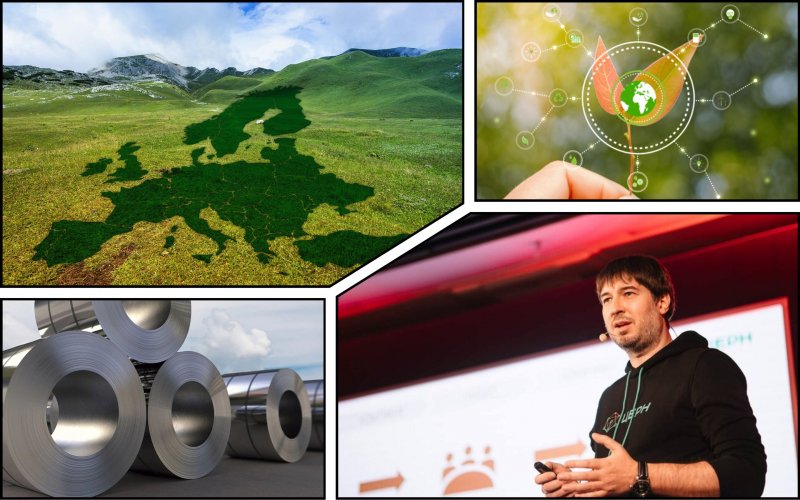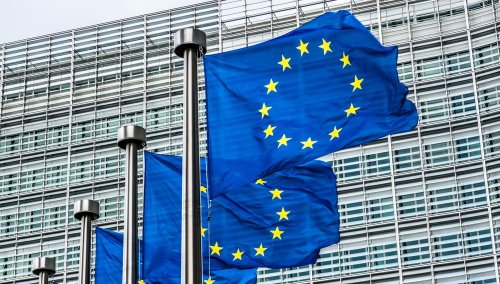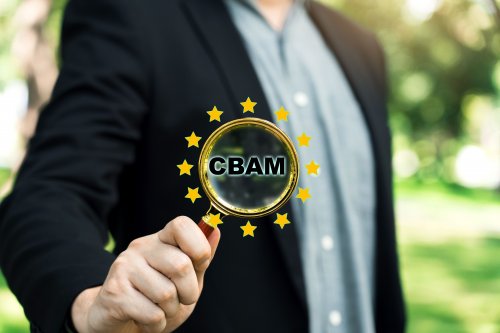Vladislav Antipov, head of the Center for Ecology and Development of New Technologies, has warned that the European carbon adjustment mechanism for imports, CBAM, could create additional costs for traditional steel products of up to €100 per ton.
This applies to metal produced in blast furnaces and oxygen converters, and the amount of such costs will depend on the EU carbon price, he told Mind in an interview.
Antipov emphasized that approximately $6 billion of Ukraine's exports, almost 90% of which are mining and metals products, are subject to the CBAM.
He explained that until 2026, the first phase of the CBAM, importing companies will only have to report on the carbon footprint of their goods, namely emissions from
- ferrous metallurgy;
- aluminum;
- fertilizers;
- cement;
- electricity;
- hydrogen;
- some other goods under certain conditions.
At the second stage, companies will have to pay so-called CBAM certificates.
According to him, the carbon duty creates not only risks for Ukrainian companies, but also opportunities. After all, competitors from other countries will also bear similar additional costs.
"If the Ukrainian economy can make the transition to low-carbon development and implement the principles of the circular economy, then despite the additional costs associated with CBAM, our products will become more competitive in Europe," Antipov explained.
He emphasized that reporting under CBAM differs significantly from Ukraine's "monitoring, reporting and verification of greenhouse gas emissions" (MRV) because:
- reports have a different form and approval procedure;
- The MRV covers only direct emissions from the installation (Scope 1), while the CBAM needs to include Scope 2 and Scope 3, i.e. indirect emissions from electricity production and emissions in the value chain;
- in CBAM, emissions are calculated for each product category separately, and for MRV, all gross emissions from the installation are taken into account.
According to him, the contradiction between the CO2 taxation system in Ukraine and the EU is a real problem. After all, in Ukraine there is no synchronization of MRV as a system of accounting for greenhouse gases and a system of taxation of the same gases.
Antipov noted that the reports of MRV are submitted, verified and approved annually, and taxes for greenhouse gas emissions are paid quarterly. Therefore, industrial enterprises in 3 out of 4 quarters have to pay taxes without an agreed figure for greenhouse gas emissions.
"This problem is easily solved by transferring the payment of the tax on greenhouse gas emissions to an annual basis, but our government and the Verkhovna Rada are not in a hurry with this issue," he said, adding that the Ministry of Environmental Protection and Natural Resources plans to launch a full-fledged national system of trading quotas for greenhouse gas emissions (ETS) in 2026. – In the future, it is planned to combine the Ukrainian and European emission trading systems, but today this goal is too ambitious."
Antipov emphasized that the creation of an ETS is an important step towards European integration, which will mitigate the effects of the CBAM on Ukrainian enterprises. The carbon price will depend on the government's policy and the level of industrial production in the country.
He added that Ukraine's climate policy currently depends on the negotiation process of Ukraine's accession to the EU. However, its reform should be very clearly synchronized with the availability of funding for implementation at specific enterprises.
"Without clear sources of funding, which, unfortunately, have not yet been clearly defined, all our reforms and strategies will remain on paper, as has been the case for the past 30 years," Antipov emphasized.
Earlier, EcoPolitic wrote, that GMK Center analyst Andriy Glushchenko warned that accelerating the launch of the emissions trading system, the pilot launch of which is scheduled for 2025, increases the risks of future "distortions" in the ETS.
Earlier, EcoPolitic talked to Olha Boyko, coordinator of the EBA's Industrial Ecology and Sustainable Development Committee, about whether Ukraine is ready to launch the ETS both legally and in reality.





